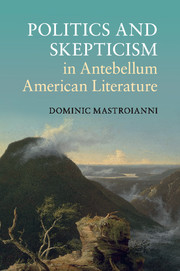Book contents
- Frontmatter
- Contents
- Acknowledgments
- Introduction: secret springs
- Chapter 1 Moods and the secret cause of revolution in Emerson
- Chapter 2 Revolutionary time and democracy’s causes in Melville’s Pierre
- Chapter 3 Hawthorne and the temperatures of secrecy
- Chapter 4 Causes of falling, Civil War, and the poetics of survival in Dickinson’s Fascicle 24
- Conclusion: antislavery writing, skepticism, and scorching words
- Notes
- Index
Chapter 4 - Causes of falling, Civil War, and the poetics of survival in Dickinson’s Fascicle 24
Published online by Cambridge University Press: 05 November 2014
- Frontmatter
- Contents
- Acknowledgments
- Introduction: secret springs
- Chapter 1 Moods and the secret cause of revolution in Emerson
- Chapter 2 Revolutionary time and democracy’s causes in Melville’s Pierre
- Chapter 3 Hawthorne and the temperatures of secrecy
- Chapter 4 Causes of falling, Civil War, and the poetics of survival in Dickinson’s Fascicle 24
- Conclusion: antislavery writing, skepticism, and scorching words
- Notes
- Index
Summary
In a September 1861 Atlantic Monthly article titled “Bread and the Newspaper,” Oliver Wendell Holmes writes of the somatic effects that wartime news can have on noncombatants. Adverse reactions range from nausea to death. Relating an anecdote in which three people are told of “a sad disaster to the Federal army,” Holmes states: “Both the gentlemen complained of a sudden feeling at … the pit of the stomach, changed color, and confessed to a slight tremor about the knees. The lady had a ‘grande revolution,’ as the French patients say,—went home, and kept her bed for the rest of the day.’” Aware that “the reader may smile at the mention of such trivial indispositions,” Holmes insists that Civil War news literally can kill those who hear it: “In more sensitive natures death itself follows in some cases from no more serious cause.” Citing a case where “an old gentleman fell senseless in fatal apoplexy, on hearing of Napoleon’s turn from Elba,” Holmes suggests that a friend of his “recently died of the same complaint” due to “the excitements of the time.” From the “slight tremor about the knees” to the fatal apoplectic fall, the Civil War jeopardizes what we might call the standing of the noncombatant. Holmes articulates a shared view that military losses threaten survivors with metaphorical, but also literal, death. Writing of death in the Civil War, Drew Gilpin Faust states that “the bereaved might suffer a living death of spirit, heart, and hope,” while “some grieving survivors did indeed literally perish.” During the war no one produced a more ambitious body of work about survival than did Emily Dickinson. Fascicle 24, a handmade collection of poems that she assembled around the spring of 1863, offers Dickinson’s most poignant and sustained engagement with the questions of survival and transformation imposed by the tremendous devastation wrought by the war.
- Type
- Chapter
- Information
- Politics and Skepticism in Antebellum American Literature , pp. 119 - 168Publisher: Cambridge University PressPrint publication year: 2014



